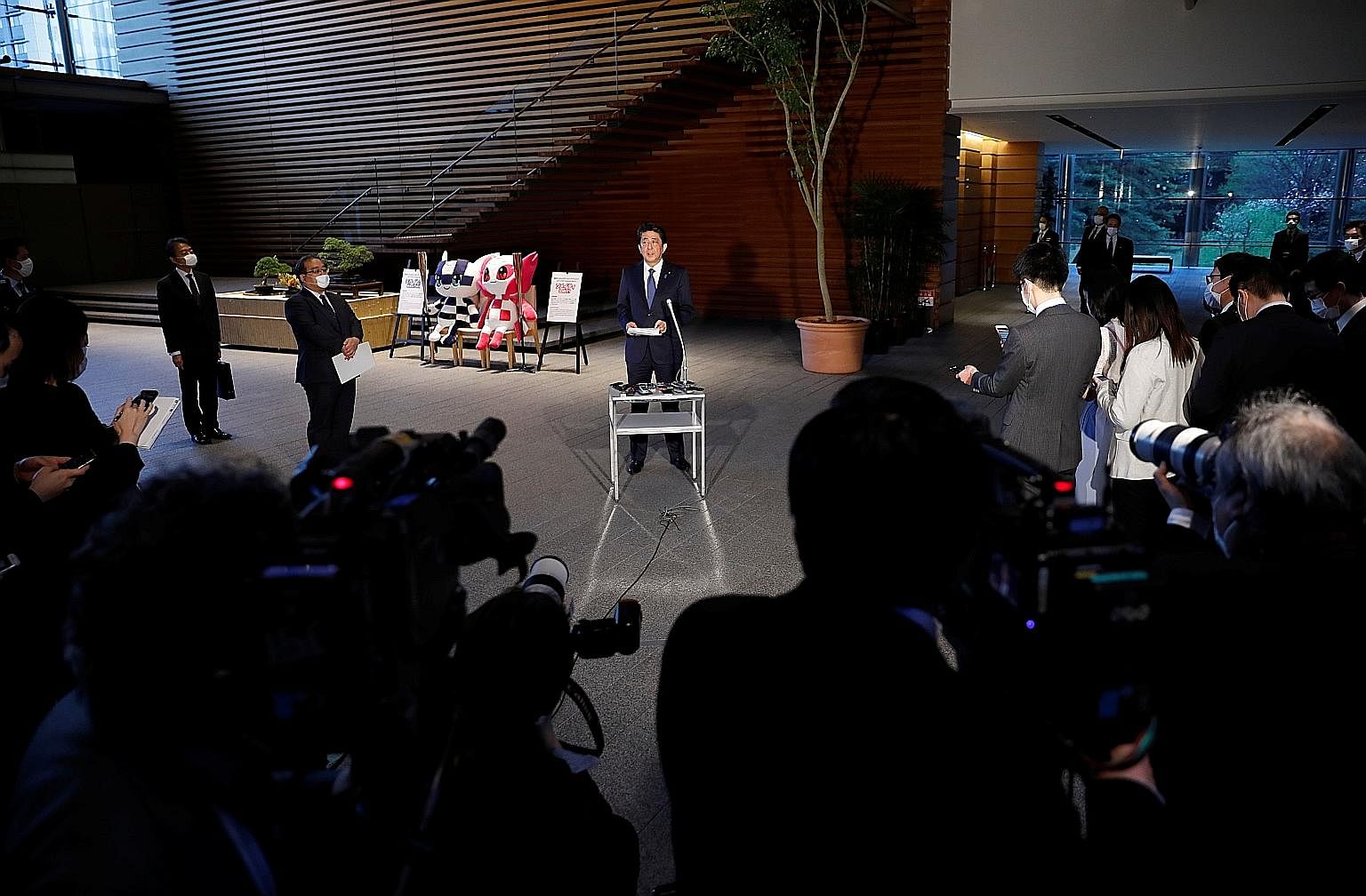COVID-19 SPECIAL
Moves to mend Sino-Japan ties hit by Covid-19
Sign up now: Get ST's newsletters delivered to your inbox

Japan's Prime Minister Shinzo Abe speaking to the media on Covid-19 last month. He has noted the fragility of Japan's supply chain due to over-reliance on China, which has crippled key industries during the pandemic.
PHOTO: REUTERS
Walter Sim Japan Correspondent In Tokyo, Walter Sim
Follow topic:
Far from turning the tide in long-frayed Sino-Japan relations, the Covid-19 pandemic and China's regional moves are threatening a fragile trust that had begun to emerge between Asia's two largest economic giants.
Chinese President Xi Jinping's first state visit to Japan, which was scheduled for last month, has been indefinitely postponed.
Experts note that Japan's security ally, the United States, has been taking an increasingly hardline stance against China. Domestically, Japan has begun to question Chinese reciprocity, while accusing Beijing of reckless aggression in regional waters at a time when global cooperation is needed to fight Covid-19.
Positive ties had been evident early in the outbreak, with Japan donating to China more than 6.3 million masks, one million pairs of gloves, 179,000 sets of protective gear, 78,000 pairs of goggles, 16,000 thermometers and 1.15 tonnes of disinfectant by Feb 7.
Japan was also the first country to be given the green light to evacuate its citizens from Wuhan, where the outbreak was first detected.
In March, Prime Minister Shinzo Abe rode on China's endorsement of Avigan - a drug developed by Japan's Fujifilm - to promote it as an effective treatment against the coronavirus even as medical experts remained sceptical.
And, wary of the diplomatic and economic fallout in shutting borders to China, Japan was late in imposing a blanket entry ban on all Chinese visitors.
Entry bans on recent visitors to Hubei and Zhejiang provinces have been in place since Feb 1 and Feb 13, respectively, but it was only on April 3 - six days after China imposed a ban on the entry of foreigners - that Japan expanded its restrictions to all of China.
Four days later, Mr Abe was forced to declare a state of emergency as the domestic Covid-19 situation worsened - a decree that remains in effect in eight prefectures including Tokyo and Osaka.
While individual Chinese cities have pledged donations to sister cities in Japan, there has been no similar show of solidarity from Beijing despite Japan's struggles with a lack of medical gear such as masks and ventilators.
Vietnam, Taiwan and Jordan have donated medical products to Japan. US President Donald Trump reassured Mr Abe in a phone call on May 8: "We can send you ventilators any time."
Meanwhile, Tokyo has publicly praised Taiwan's coronavirus response and is backing its participation as an observer at the World Health Organisation. "The international community has a great deal to learn from Taiwan," Foreign Minister Toshimitsu Motegi said last Wednesday. "Frankly speaking, there's an issue with China."
Mr Abe has exhorted Japanese firms to move production lines in China either back home or to South-east Asia, earmarking about 240 billion yen (S$3.2 billion) to help them do so.
He noted the fragility of Japan's supply chain due to over-reliance on China, which has crippled key industries such as cars and electronics during the pandemic.
The policy has not gone unnoticed in Washington, where its former ambassador to the United Nations Nikki Haley tweeted: "The US is not the only country looking to change ways with China."
Further, there has been heightened tensions around the contested Senkaku/Diaoyu islands.
Defence Ministry and Japan Coast Guard data shows that a record 289 Chinese government ships entered waters around the islands in the first three months of the year, up 57 per cent over the same period last year.
Tokyo lodged a protest with Beijing on May 8, after two China Coast Guard ships chased a Japanese fishing boat in territorial waters controlled by Japan but claimed by China.There were also incursions last weekend, amid Beijing's insistence that the boat had been in Chinese waters, blaming Tokyo for "creating new conflicts".
Japan's National Police Agency had last month formed a new heavily armed 151-strong unit on Okinawa to protect the contested islands from invasions and occupation.

